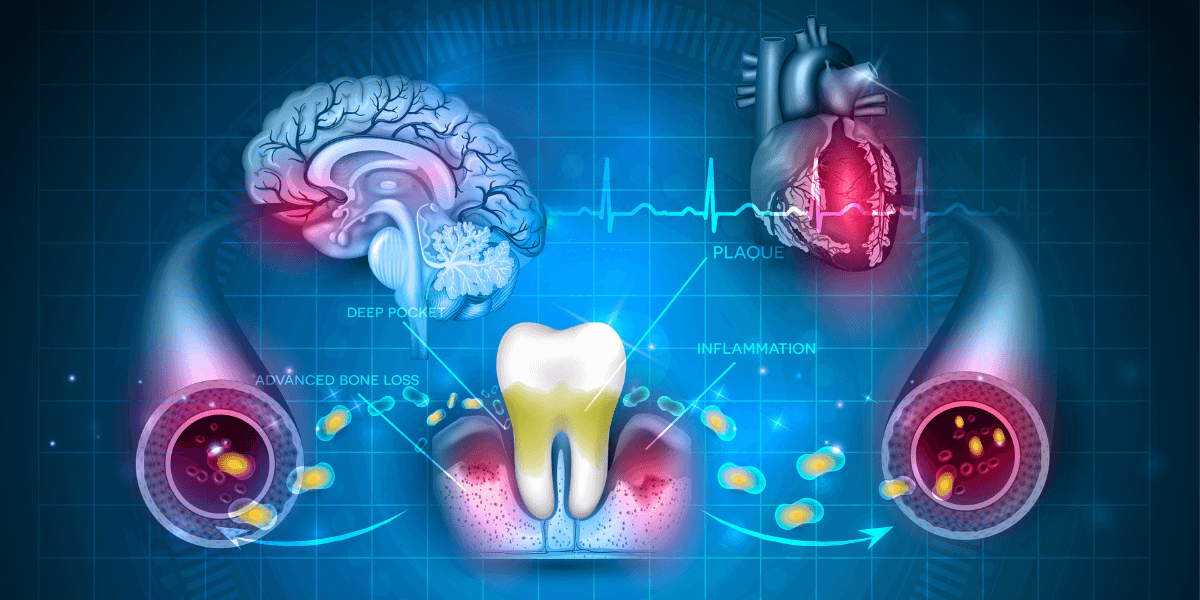
Inflammation is a natural defense against foreign invaders that can become harmful to our overall health with prolonged, systemic exposure. We need to take care of our oral health & maintain a healthy diet to keep it at bay. Learn how.
Most good health behaviors strive for the same goal: to reduce inflammation. Eating healthier will reduce inflammation in the gut, brushing and flossing will reduce inflammation in the gums , and exercising will reduce inflammation in the cardiovascular system. How does inflammation affect our overall health and why should we be striving to reduce it? Let’s take a look.
What is inflammation?
The role of the inflammatory response is simple, to heal the body. Inflammation is the body’s defense against injury or infection and is set off by a wide number of things like environmental chemicals, injuries, pathogens, radiation, systemic diseases, and many others [1]. The inflammatory response is a good thing as it means the body is working to rid the body of the pathogen. Signs of inflammation like fevers, heat, and swelling can be alarming but they’re indicative of the body working to heal itself. Inflammation is not meant to be a sustained state as the inflammatory response is incredibly taxing on the body.
What role does inflammation play in the oral-systemic connection?
Many regard oral and systemic health as two separate entities but nothing could be further from the truth. The mouth often shows the first signs of the body’s inflammatory response when people have gingivitis. These individuals often clinically present with bleeding, inflamed gums, and swollen tissues, all classic signs of inflammation. For patients that are periodontally involved, the bacteria in their mouth and underneath their gums are traveling to the rest of the body and setting off the inflammatory response. Many fail to make the connection between systemic inflammation and oral inflammation but in many cases, systemic inflammation is initiated in the oral cavity [2]. Systemic diseases like diabetes, or heart disease are exacerbated by poor oral health. When the body is in state of chronic inflammation, it is more susceptible to infections making bacteria in the mouth that much more harmful to overall health.
How can we control inflammation?
Two of the easiest, simplest ways to reduce inflammation in the body are diet and oral health. An anti-inflammatory diet is not about calorie counting or restriction, it’s about eating a variety of anti-inflammatory foods daily to boost immunity [3].Foods in this diet include plants, antioxidants, and fiber that prevent cellular stresses, and inhibit inflammatory responses [3].Foods in this diet include fruits, vegetables, and whole grains while limiting sugar, and fried, or processed foods. These foods also promote healthy gut microbiota which allow for a better balance between good and bad bacteria.
Brushing and flossing daily will significantly reduce inflammation in the body. When oral health is neglected, plaque biofilm accumulates on the teeth and harbors all kinds of bacteria. When the gums are not flossed, they get inflamed, bleed, and all the bacteria from the plaque biofilm travel to the rest of the body initiating systemic inflammation.
Inflammation in the body is a sign that your body is working hard to rid itself of a foreign invader. While this inflammatory response is a good sign and means your body is functioning as it should, it’s important to do everything you can to reduce inflammation as it means your body is working overtime to keep you healthy. Easy ways to reduce inflammation are to feed your body nourishing foods, rest, and floss your teeth. All these little changes will result in big improvements to your overall health.
- Diet review: Anti-inflammatory Diet. The Nutrition Source. (2023b, February 2). https://www.hsph.harvard.edu/nutritionsource/healthy-weight/diet-reviews/anti-inflammatory-diet/
- Klinge B. (2021). The oral – systemic link: oral infection/inflammation and the relation to general health. Annals of Medicine, 53(Suppl 1), S15. https://doi.org/10.1080/07853890.2021.1896879
- U.S. Department of Health and Human Services. (n.d.-a). Inflammation. National Institute of Environmental Health Sciences.





